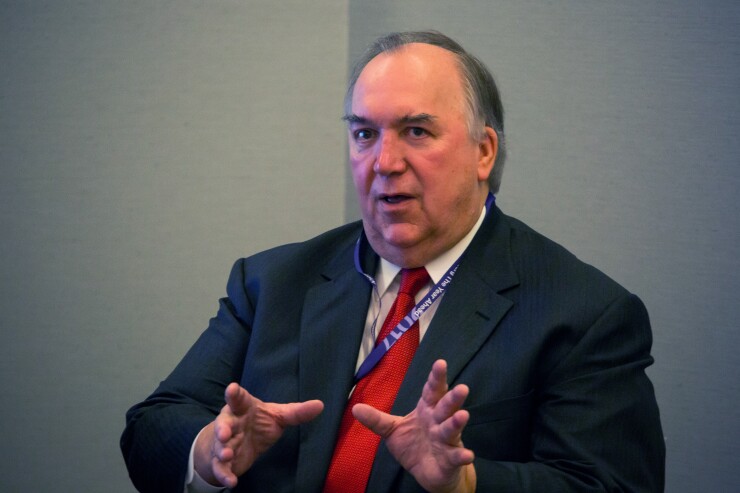Upheaval in senior management at Michigan State University won’t impact schedule to issue bonds that will fund legal settlement expenses for the Larry Nassar sexual abuse cases, the university said.
Mark Haas, the university's treasurer and vice president for finance, said the university plans to price $650 million in bonds on Feb. 7, of which $300 million will be used to refund part of a $500 million private placement issued for the settlements, with the balance used to finance construction of classroom and research buildings on campus.
Co-leads on the transaction are Bank of America Merrill Lynch and Citibank.

The sexual abuse of student-athlete gymnasts by the MSU team doctor took center stage again recently after interim president John Engler was ousted following remarks about the Nassar victims "enjoying the spotlight."
Engler announced his intention to resign, but MSU trustees forced him out a week ahead of his scheduled Wednesday departure and replaced him with a new temporary leader, Satish Udpa, previously the executive vice president for administrative services and dean of engineering. The school anticipates it will have a permanent president by June, which will be its fourth in a relatively short period of time.
"It is certainly an area that the school is very sensitive to and wanted to put behind them,” said Howard Cure, director of municipal bond research at Evercore. “This is just putting it on the front page again.”
MSU brought in Engler, a former Republican governor and MSU alum, to lead the university out of crisis. His departure adds to the long list of people who have been fired, forced out of their jobs or charged with crimes amid fallout from the school's handling of the sex abuse perpetrated by Nassar.
Haas said the recent leadership transition will not impact the timeline of pricing its bonds.
“I think most investors realize that the university has a lot of strong operational aspects and financial resources; I just don’t think they are comfortable with the leadership and the board acted quickly which is a good sign,” said Cure. “People may be more comfortable delaying this just a little bit more.”
“Getting rid of Engler only helps the argument that the school is trying to change its culture,” said Matt Fabian, a partner at Municipal Market Analytics. “So I don't think this matters much, but if it does, it's a marginal positive.”
MSU had originally planned to fund the costs of the settlement with a public bond placement but the university, citing the settlement’s narrow payment timing requirements, opted to do a private placement instead. The bonds were privately placed RBC Capital markets. The bonds have a mandatory tender date of December 4, 2020.
Moody’s Investors Service affirmed its Aa2 rating of the bonds and S&P Global ratings affirmed its AA rating on the bonds. The outlook for both ratings agencies remains negative. Both Moody’s and S&P downgraded the school one notch following news of the settlement last year.
Moody’s said the university’s substantial financial reserves, continued strong philanthropic support, liquidity and its status as the land-grant university support MSU’s continued good strategic position as it faces the possibility of additional claims not included in the settlement.
“The risks associated with these additional claims are not included in a completed settlement payment, but the university favorably does have $75 million in dedicated litigation reserves for these claims, partially mitigating additional financial risks,” Moody’s said.
“This debt issuance significantly compresses the university's available resource ratios, which we accounted for in the summer of 2018 when we lowered the rating,” said S&P Global Ratings credit analyst Jessica Wood.
Wood said that the negative outlook reflects the recent and anticipated management turnover and fiscal 2018's weak financial operating results, although one-time in nature due to the settlement payout, were extremely negative on a full-accrual basis.
“An outlook revision back to stable would be characterized by a successful transition of, and some stability in, the senior leadership team and maintenance of enrollment and demand metrics,” Wood said. “In addition, we believe financial operations must return to historical levels and balance-sheet metrics must improve from current fiscal 2018 levels to maintain the rating.”
Last June, the university's trustees approved the $500 million settlement and related bond sale. More than 300 girls and young women sued the university for failing to act against Nassar for sexually abusing them. Nassar was sentenced in January to between 40 and 175 years in state prison after pleading guilty to counts of criminal sexual conduct.
At the end of fiscal 2018, the university reported $3.7 billion in total cash and investments. Of that amount, more than $3 billion is spendable cash and investments.





